|
|
The Ninth Street Center
Ninth Street Center Journal |
Conversations with Our Counselors
In these statements, condensed from interviews conducted during the past few months, counselors on staff at the Ninth Street Center discuss their attitudes towards counseling, the problems typical of gay people, the psychiatric establishment, and some of their own personal aims and goals.
Click on any of the following names to go directly to that interview:Jurgen Schmitt Mark Liebergall Tom Rauffenbart Rick Shupper David Tesdell Tony Rostron Angelo Mendez Peter Osnato Larry Wheelock Collie-Pete Skye Doug Zellner Giulio Sorrentino
Jurgen Schmitt
I'm trying to isolate all the impact areas of counseling and one of the ones I've come up with is learning how to support another person. It's really quite difficult to do it with the kind or responsibility that implies that you're somehow going to change their situation, but learning how to do that is what it's all about for me.
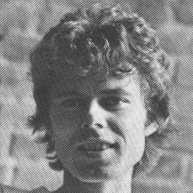 A psychiatrist once came to my discussion group at the Center and said, "If you haven't been trained, how do you know you're not going to fuck somebody up?" My answer to him was, "If we're going to be frightened of intervening in somebody else's life when we know that our motives are good, then we might as well pack up our bags and go to our apartments and watch television."
A psychiatrist once came to my discussion group at the Center and said, "If you haven't been trained, how do you know you're not going to fuck somebody up?" My answer to him was, "If we're going to be frightened of intervening in somebody else's life when we know that our motives are good, then we might as well pack up our bags and go to our apartments and watch television."
The kind of people I do counseling with are people that have the desire to dishevel their lives a little bit and accept some challenges that are part of learning how to live creatively. This means dealing with people closely, communicating information, and learning how to support and love each other. In political work, these problems don't get dealt with very immediately.
The first thing I teach people is to put into perspective the struggle they have with society, or social institutions or ideas that were programmed into them, and to start dealing with everyday existence in the form of people, friends and lovers. It takes a while for people to accept the idea that they can be what they want, that they have a choice. I think as children it's pretty clear to us, but it gets confused along the way as we become supposed adults.
I try to impart a childlike ability to think about all the wonderful things that human beings are, and what we can be and can do. Once it gets into that area it's very exciting because that's when people start growing. I remember as a kid I had dreams and fantasies of becoming vital and important, and unfortunately it somehow got channelled in conventional career directions. Once I found out how important it is to have relationships, to be important to people on a day-to-day basis, the whole other thing behind it came into perspective and I was able to separate the two.
I like to think that I can inspire people to ask more for themselves from life, that just by talking to me they can get the idea that life is more important or beautiful than they ever dreamed. I'm taking a very optimistic position about life, based on my own experience.
Mark Liebergall
When I became homosexual I felt free of a great amount of bullshit. I know that people are shackled by a lot of things that they don't believe in, that aren't in their interest to pursue. they pursue them because of the enormous social pressures that play on people, and one of those things is heterosexuality. People don't want to get involved in other people's lives in the straight world, Men don't -- they can't. They're afraid of sex.
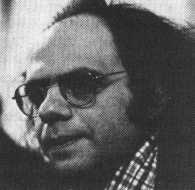 Developing in life is a very difficult task. You're always up against the problems you had in the past. Somebody has to be there to interpret what's happening so that you don't get overwhelmed by the fact that you've stepped out into a bigger world and you find that you still have the same old problems that you had three years ago.
Developing in life is a very difficult task. You're always up against the problems you had in the past. Somebody has to be there to interpret what's happening so that you don't get overwhelmed by the fact that you've stepped out into a bigger world and you find that you still have the same old problems that you had three years ago.
Homosexuality is very positive in people's lives because they can become free of a lot of conventional social imagery that rules them, chains them down, that directs their lives. They can get outside that. It's the first step. Becoming gay is an opening-up process to people: they feel they can be more honest and more real. Then the challenge comes up, "What do you do with it?"
Once you give up the domination of the straight world, you come up against defenses you have individually. There are layers to this. One falls away and you see another one. When they enter this open but confused territory I direct them towards other people so they can work on being more effective and relating better.
What I get out of counseling is the same thing I bring to the counselees. I confront the same problems, and that's why it's positive in my life. I've had difficulty in getting involved with people, in social and other situations. I felt I needed to be something special for someone. Counseling has that in it for, potentially. That's the challenge. And I think I can be much more honest with someone than a professional can, and for a very good reason: I don't earn my livelihood out of it. I don't have to keep somebody around I don't care for.
The most important thing in counseling is that you have to see who the person is first. To do that you have to feel something about their basic capacity, basic value. They want to be happy. That underlies it all. They want somebody in their lives that really cares about them, who they can rely on, who means something to them. They want to be able to trust somebody, to go further with somebody that they've ever gone before, or care more than they ever have before.
Tom Rauffenbart
Counseling is more that just getting over problems and it's more than just learning how to cope with things. In growing you need to get together with somebody who can really offer you some direct advice, a place to sort out all the confusions that come from leading a constructive, growing life.
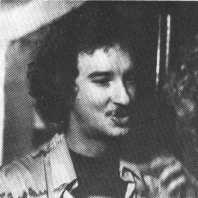 I really want to deal with people who are dissatisfied with what they feel is their life in the gay world and want something more. That'll be the starting off point. Most straight people I've spoken to really aren't that open to the kinds of things I'm talking about, and I'm not prepared to put in the energy or the time to really convince them about anything. I'd say gay people have a better opportunity at this time to really deal with what creativity and growth mean because they have independence.
I really want to deal with people who are dissatisfied with what they feel is their life in the gay world and want something more. That'll be the starting off point. Most straight people I've spoken to really aren't that open to the kinds of things I'm talking about, and I'm not prepared to put in the energy or the time to really convince them about anything. I'd say gay people have a better opportunity at this time to really deal with what creativity and growth mean because they have independence.
A lot of gay people think, "I was just automatically gay. There was no decision involved," but that's not really true. They've made their first big decision by just saying, "I'm going to live a gay life." And if they can make that kind of move it's an indication that the potential exists for something more. Now, a lot of them don't ever do anything about it because it's just as easy to get lost in this gay world as it is in the straight world. But of somebody really wants something different they can really do it on an independent, searching basis through being homosexual.
The first thing is improving the quality of the way they relate to other people. Everything else can be built on that. A lot of gay people just accept the idea that they have to fit into whatever their situation is. But once they have an idea that they want to change it, to get around some people who are working towards that themselves is a good way. The kind of counseling we do can be helpful. All of us are trying to improve our relationships, thereby improving our relationships with the world.
The gay movement is a good first step for somebody who feels they've been wrong all the while and need to say, "It's okay that I'm homosexual." But often it stops there. The movement was good. I got something out of it. But it's not enough.
When they come for counseling they have to be able to admit to themselves that there's a problem. If they're on the defensive and say "it's because of other people" then they can't really move. I look for people I can confront with something that we can work with. If they don't want to look at their problems there's no place for counseling.
We're in a position as counselors where the danger is to become like professionals. I would like people to know that we're human, we have our own lives. I may know more now from living through my experiences, but I'm just as prone to problems in my life as anyone who comes to me for counseling.
Rick Shupper
I like the people that I counsel. Counseling lets you interact with people on a high level. I have a lot of trouble getting to some people, in just carrying on a loose-ended relationship with them. But since they come every week and we're there to get into some kind of creative use of our human capacities, people tell you things. They get into the habit of really letting you know where they're at.
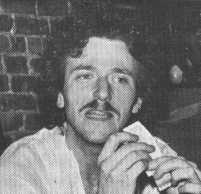 I get counseled by Paul. I told him when I first came to him, "I majored in psychology but I don't want you to consider me a psychologist because I don't think that any of my training did any good. I don't understand psychological terms. really." And Paul said, "But that's what I want you to be. I want you to be a psychologist. We'll work out these ideas. We'll make meanings for them that are useful to us, that get to the point." I've seen Paul for about six years. That's where I got my basic outlook. He helped me to focus up on what I think is important in life.
I get counseled by Paul. I told him when I first came to him, "I majored in psychology but I don't want you to consider me a psychologist because I don't think that any of my training did any good. I don't understand psychological terms. really." And Paul said, "But that's what I want you to be. I want you to be a psychologist. We'll work out these ideas. We'll make meanings for them that are useful to us, that get to the point." I've seen Paul for about six years. That's where I got my basic outlook. He helped me to focus up on what I think is important in life.
Homosexuals are really wonderful people, and the main problem they have is in making that real to themselves: their beauty, their real goodness. They have to bring it into existence in a world that doesn't encourage it, that very often is hostile to the whole process. I try to show them when they're trying to love completely unlovable things. Their main problem is actually feeling enough that they're right or being liberated enough to know that they can experiment. It takes a lot of courage. It takes a lot of real desire to be honest, but they've got it. They've got problems, but they've got the keys to the answers too.
If someone came to me and said, "What I want to do is go straight," I wouldn't fight it. But if I cared enough about the person I would try to show him that this is some kind of brainwashing, some kind of intimidation. It has a conventional ring to it. It's what he's supposed to want, what he's supposed to feel about. Many homosexuals don't really use their homosexuality in a way that makes in any better than being straight, but you can. I want them to set high goals for themselves.
Being homosexual is better for anybody who wants to use their capacities in creative ways. People who don't want to do that are really in more trouble as homosexuals than as straight people. You're closed to sources of depression if you're and not trying to be creative.
David Tesdell
People who come to counseling have reached some kind of crisis. There's something that they realize is lacking in the quality of their life. In a lot of cases they've been going on with an automatic programmed gay life and are looking for answers. How to improve all that, for me, is getting rid of old concepts of what it's like to be gay. It's a matter of getting back to that spark when you first came out and you felt that it was terrifying but you were alive.
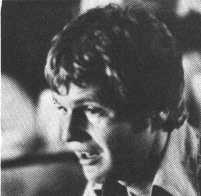 When a person throws off straight programming, it's a time of chaos and experimentation and excitement. In a lot of cases the excitement of saying, "Hey, I'm doing something new," can carry him through that period where he's discovering new things that nobody ever told him about.
When a person throws off straight programming, it's a time of chaos and experimentation and excitement. In a lot of cases the excitement of saying, "Hey, I'm doing something new," can carry him through that period where he's discovering new things that nobody ever told him about.
A lot of people who are coming to the Center are just coming out and they're excited. What I want to do is keep that excitement going before they slide into patterns that are just as strong as those they got out of. That's what I'm trying to do myself. If there's no danger or tension I feel I'm just letting things slide. Everyone on the street and in the straight world seems dead, and the reason is that they just settle for something.
Counseling is the one place where in an hour the best is demanded from me. It's a challenge to me, because I don't always know if I can do it but I know I damn well better try because this is someone who's coming for help. And it's a way for me to reach other gay people, to find out how others live. If the situation is right, they trust me and I get to know them very clearly.
Tony Rostron
It took me a long time to get off my ass and start counseling. I didn't have the sense of security. There were still too many doubts in my own head. When I finally did take the first step I got some appreciative responses.
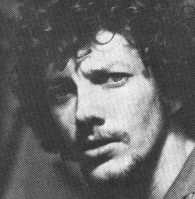 My biggest benefit from counseling is that it gives me a chance to really work with what I know and explore developing techniques, and it just really keeps me in touch with my identity. I'll give you an example of that. It used to be that when I got tired I would just let myself get depressed. Well, it was one of those tired, semi-depressed days and I was in a counseling session with someone and he started asking me questions about growing, and I had a chance to recap it all. It put me in touch with my identity, who I was. In the course of that ten-minute rap I was giving him I was alive again, I was real, I was right there. And it felt very good.
My biggest benefit from counseling is that it gives me a chance to really work with what I know and explore developing techniques, and it just really keeps me in touch with my identity. I'll give you an example of that. It used to be that when I got tired I would just let myself get depressed. Well, it was one of those tired, semi-depressed days and I was in a counseling session with someone and he started asking me questions about growing, and I had a chance to recap it all. It put me in touch with my identity, who I was. In the course of that ten-minute rap I was giving him I was alive again, I was real, I was right there. And it felt very good.
Counseling gives me a chance to put all the insights that I'm acquiring to work for someone else, and to find out how I can get it to them. And each person is different. Each person is a whole other thing outside myself that I can be in love with and go to work for. When I'm in that state then I'm really at my best. To use what I have available to me and sharpen my tools is what it's all about. Counseling is a perfect testing ground for that, it's the perfect laboratory.
I tell my counselees this too. I've seen this one fellow twice and his first question to me before we started was, "What do you get out of counseling?" I told him, "I'm conducting this experiment with my life: I'm learning how to be a better person. And when I'm in a situation like this where I'm called upon to be at my best, it only helps me become better." It established the ground-work for a relationship between us, and we began to talk about very real things.
The Center has given a lot of us our first opportunity to really explore questions like, "Okay, what is real moral responsibility all about?" or, "What is romantic love?" Some of the people have taken the first step to real leadership by starting the open talk groups. A lot of good things come out of it. People are getting to know each other in a real way. And once you have that you're not afraid to open up anymore. You have friends, there are people you trust, you're with people you want to be around, you're thinking about things you want to think about.
So the net outcome of counseling for me is that it just broadens my human experience in a very personal way. The techniques that I learn I know I can put to use again maybe in a different way, in a different language or with a different person. But it's there, it's mine, it's something I know is working and can trust. I believe in it.
Angelo Mendez
Well, I'm not used to interviews and somehow I always forget what I have to say. I just have this faith that we might be able to reach a great deal of people, at least in New York City, because I love gay people. They're very special, they have so much potential, but they're not using their abilities. But they do have the advantage over the straight world and I want to see the day when a lot of people get into a better way of living.
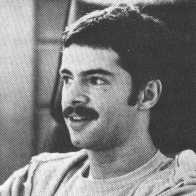 I would like to see them working more on their problems and their defenses, their love relationships. I think they have a chance to have happier love relationships. And they have to realize that the problems will be there. I think the fear about confronting a problem is worse than the problem itself. In my parents' home the rule as: always stay away from problems. Now it's the opposite, now I love problems. I'm optimistic about gay people. I like to see them trying to do something for themselves. I'm an expansionist. I believe in many organizations and many individual relationships.
I would like to see them working more on their problems and their defenses, their love relationships. I think they have a chance to have happier love relationships. And they have to realize that the problems will be there. I think the fear about confronting a problem is worse than the problem itself. In my parents' home the rule as: always stay away from problems. Now it's the opposite, now I love problems. I'm optimistic about gay people. I like to see them trying to do something for themselves. I'm an expansionist. I believe in many organizations and many individual relationships.
Not everyone I counsel do I meet at the Center. I call myself the Center's man on the road because I'm out on my bike a lot and you meet people that way. I love it. I learn as I'm counseling. I learn about myself, especially about lovers. If I'm out and I meet somebody who has a a lover and is having a problem, that's exciting. And I've noticed that when it comes to lovers, it seems like we all make the same mistakes.
Having a lover was a great experience for me. With Tom there was an attempt to move into something better, with a different approach. There was an optimism that problems could be solved. A lot of gay people settle for what they get. I fell into that with the lover before Tom. Everything was very comfy, we lived very conventionally with nice furniture. I remember one day after we had had guests we were sitting in the living room. I looked at him and said, "This is the most beautiful cage I've ever lived in." It was all the way up there on the sixteenth floor facing the ocean.
What I notice about people is that they haven't really been loved, cared for. And when they start opening up, there's a change in them. When I first met this one person I'm thinking of he was very nervous and extremely aggressive, always looking at the negative side of life. He learned to relax a lot more, and he still comes to me when he has problems.
One person I'm counseling lives at home with his parents and he has difficulty relating to them. I'm trying to remind him that his parents have their own defenses. I think it's important that he's aware of it. Not to fight it, like I used to do with mine, but to see it so that you can protect yourself from it. Meanwhile he can develop a life of his own, explore what life has to offer, and meet people who are more worthy.
I've been counseling in Spanish lately, so I've been teaching in two ways, psychologically and English. I don't want to counsel just in Spanish because it's important that they develop an ability to communicate in English. So I sometimes use two sentences explaining the same thing in two languages.
I'm getting much more in contact with a feeling of strength. In counseling, it's a new way of loving and caring for somebody. At home in Spain they don't know how to love like that, they didn't know that love is not just a word. To me love and care just meant cuddling and kissing, or adolescent adventures. Now it's something very powerful, something that works, something that can be channeled.
Peter Osnato
When somebody comes to me for counseling and says, "Look, I'm a gay person but I feel kind of empty -- what can I do to better my life?", I usually ask some basic questions about what their present involvement in gay life is about. I work on what does give them satisfaction, and ask if they have any important relationships or any relationships that have been meaningful.
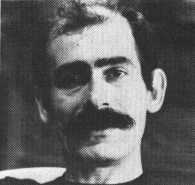 I think that stable gay lover relationships can help individuals lead better lives, but of course there's always the question of what the stability is based on, whether the needs are that dynamic, whether they are being met that dynamically. When I hear of a very stable relationship I check it out deeply because usually this kind of relationship has a lot of problems that they don't want to confront. The first thing I may suggest is that they try to make spaces in the relationship so that they could get an idea about their individuality. Stressing the point of independence I think is important. Within those spaces the individual begins to see his freedom, and also the challenge to explore that area.
I think that stable gay lover relationships can help individuals lead better lives, but of course there's always the question of what the stability is based on, whether the needs are that dynamic, whether they are being met that dynamically. When I hear of a very stable relationship I check it out deeply because usually this kind of relationship has a lot of problems that they don't want to confront. The first thing I may suggest is that they try to make spaces in the relationship so that they could get an idea about their individuality. Stressing the point of independence I think is important. Within those spaces the individual begins to see his freedom, and also the challenge to explore that area.
Gay people are going to help themselves by getting involved in the gay movement. It helps expose the individual to what is happening with the gay movement in general. I don't stress too much importance upon the political aspects, the established aspects of the gay movement, unless it satisfies their exploratory needs.
I think the advantages of being homosexual at this stage of history are very exciting. I think it's an opportune time to grow since, with all the movements of the 60's from the hippie generation right on down the line, civilization itself was exposed to a lot of potential human development.
It's a perfect time for homosexuals to realize their part in it. Of course I have a lot of faith in homosexuals on that exploratory level. As I candidly say, homosexuality is not a perversion of civilization but an extension of it.
Larry Wheelock
I think many gay people help themselves, to start, by admitting that they're gay. It's a very big step but certainly not the last in terms of making a better life.
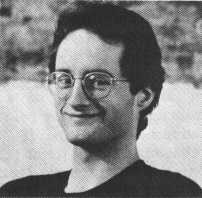 I have enjoyed my counseling work so far. In a sense I counsel a lot of people all the time but not in the structure of a time limit and a place. I'm trying to learn to do that just in my conversations with people. That implies receiving counseling too.
I have enjoyed my counseling work so far. In a sense I counsel a lot of people all the time but not in the structure of a time limit and a place. I'm trying to learn to do that just in my conversations with people. That implies receiving counseling too.
Gay people can improve their lives by expanding their definition of love and working it out. For me it is mental work first before it becomes reality.
I've always seen that deep relationships traditionally begin with the sexual element. That was really not necessary in my life at all. There's a great deal of ground work needed to develop understanding between two people before sexuality finds its place.
The advantage of living in the gay world is that it's given me a whole circle of people who are willing to question values that other people had set up for them, question them in their own lives and find values that are bigger, that they can offer to other people to use.
Collie-Pete Skye
Counseling is a microcosm of the communication I hope to have with people. It sets up a situation of give and take, expression and response. I feel there is a certain amount I have to give. When I don't understand a situation I hope to learn so that I can give in some future time. I don't walk into a counseling session feeling that I have some preordained power that says I have a right to sit at this end of the room and they at the other end. There are a good many times that I feel the position of the chairs may reverse. I'm learning things, receiving information all the time.
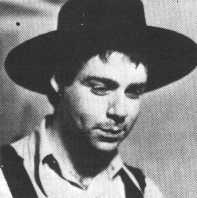 I find homosexuality to be a strong key to unlocking doors between people. It makes it easier for people to relate. Homosexuals as human beings can definitely find a tremendous amount of happiness. Just by realizing that they're homosexual they've taken a tremendous step in looking for that happiness.
I find homosexuality to be a strong key to unlocking doors between people. It makes it easier for people to relate. Homosexuals as human beings can definitely find a tremendous amount of happiness. Just by realizing that they're homosexual they've taken a tremendous step in looking for that happiness.
The main problem I've been dealing with in my counseling is people's ineffectiveness in giving of themselves, in not fully understanding what of themselves they can give, and analogously what they can expect. This goes for me as well. When I am put in a position of having to verbalize what I feel, I then have to see whether what I feel is genuine or if I've just accepted something theoretically. This draws on all my experiences and all my insights and puts them into play.
The Center itself is therapy oriented. It's an atmosphere I picked up soon after I got here. There was something specifically different about it. The Center to me is a screen. Walking through that door cuts out a lot of the distortion that gets in the way of communication between people. Once a person approaches the Center a lot of these distractions are deliberately removed, a lot of the false emphases are set aside. That in itself is pretty therapeutic, but even more so, people are communicating with each other in a very no-holds-barred way. The atmosphere at first seems tense. I think that the people who find this of value, the people who do work with it are those who have been searching or have been dissatisfied with the quality of their lives. The Center provides almost a huge sigh of relief, like "My God, I can actually be human. There is no need for me to lie because what I am is much better than anything I've lied about being."
Doug Zellner
My basis for counseling is my experience and the fact that I feel for other people. I had very few tools to work with before I met Paul. But the enjoyable parts of my life have always been involved with people's problems. I've learned a lot. I see problems on a deeper basis now. And I get to see my own problems through counseling. But I only take somebody I feel something for, so that the feelings I offer them are real.
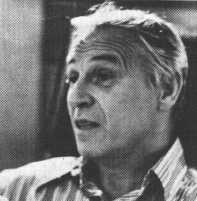 I feel quite divorced from the gay liberation of parades and slogans. They seem only to want to liberate cocksucking. And that's not what I've ever felt I was all about. I guess when I reached the conclusion years ago that I was person who loved other people, and primarily men, relating on that basis allowed me to live comfortably with what I knew I was. I feel like a soldier more in creating a better world. And it just so happens that at this moment in time homosexuality is a place where you can reach more people. I can't reach straight people -- they have no idea of deep feelings for another man. They get embarrassed with it as soon as it starts, and they run away from it.
I feel quite divorced from the gay liberation of parades and slogans. They seem only to want to liberate cocksucking. And that's not what I've ever felt I was all about. I guess when I reached the conclusion years ago that I was person who loved other people, and primarily men, relating on that basis allowed me to live comfortably with what I knew I was. I feel like a soldier more in creating a better world. And it just so happens that at this moment in time homosexuality is a place where you can reach more people. I can't reach straight people -- they have no idea of deep feelings for another man. They get embarrassed with it as soon as it starts, and they run away from it.
Sometimes when I take fantasy trips about the world of tomorrow I see the mind opening in so many directions. I don't think the world of the future will be recognizable to the people who live today. It will be much more beautiful, there will be much more understanding between people, and certainly there will be new and different problems from the ones we see today.
If a person comes out when they're very young, if they haven't really been accepted in the heterosexual world, and if they find that they fit the definition of what's considered physically beautiful, they go berserk. There's just no stopping them in the physical sense because they can have anything they snap their fingers for, and the run into problems of being exploited sexually. They feel more, they feel for men, but I don't think that this is ipso facto any improvement in the world. Yet I still recommend homosexuality. I firmly believe that people need to understand the qualities of the person they say they're in love with, that they care for, and that they won't be able to recognize those qualities unless they see them in both men and in women. Unless they recognize their own homosexuality I don't think they could ever truly be themselves.
I've always felt that the world's leadership was rotten. And I never knew what you did to get better leaders. I thought that it was something magical, that they were born maybe. Well, what you see more and more of at the Center is the ability of people to handle on an adult basis exactly how they want to live and to take responsibility for their actions without having to make any excuses for it. If they want to do something they go ahead and do it, and if it fails they see all the things that went wrong and what they're not going to do the next time. I think the support too is important in letting people feel free. In my own case, helping me get rid of living a lifetime of intimidation and helping other people feel freer to do what they want to do is my way of moving forward somewhere. I don't know any other place in the world where they're training people to be leaders. That's the exciting part.
Giulio Sorrentino
I would say that people in crises who have to either compromise and say, "Well, okay, life is just not going to be that interesting " or else "I'm going to have to do something radically different about the way I'm living my life" are ripe for creative kinds of therapy, the kind of therapy that gets beyond the whole paramedical metaphor of "You're sick, so you go to a doctor, and then you get well." Therapy is a terrible word because it sounds like we're all wearing white coats, but all it means is just that you have your friend's best interests at heart.
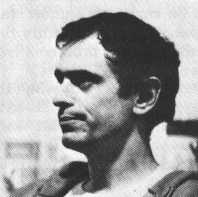 When conventional therapists get into creative areas I am opposed to what they do because I don't think they know anything about those areas. To get into that kind of area, the therapist himself has to be leading a creative life, and a therapist who's leading a creative life has to be willing to pursue truth no matter where it takes him, which means that he's going to have to get into a lot of experimenting. The people who are at the top of the psychiatric profession are absolutely not permitted to have difficult times. They can't admit of being troubled or confused or lost because they are the official holders of the truth in the area of what let's call sanity is. A man who's in a position where his accreditation is going to be taken away from him as soon as he becomes bothered, unconventional or far-out is not in position to teach others how to be creative. This doesn't mean that in the moment of doing therapy you're being creative, but rather that you have a creative life which qualifies you to talk to another person about the nature of creative development.
When conventional therapists get into creative areas I am opposed to what they do because I don't think they know anything about those areas. To get into that kind of area, the therapist himself has to be leading a creative life, and a therapist who's leading a creative life has to be willing to pursue truth no matter where it takes him, which means that he's going to have to get into a lot of experimenting. The people who are at the top of the psychiatric profession are absolutely not permitted to have difficult times. They can't admit of being troubled or confused or lost because they are the official holders of the truth in the area of what let's call sanity is. A man who's in a position where his accreditation is going to be taken away from him as soon as he becomes bothered, unconventional or far-out is not in position to teach others how to be creative. This doesn't mean that in the moment of doing therapy you're being creative, but rather that you have a creative life which qualifies you to talk to another person about the nature of creative development.
The only thing I'm proselytizing for is an understanding of what homosexuality is in other people, and once they understand what it is they'll be in a position to explore it freely. If they choose not to I think that's fine too. At this moment in history, however, I think it's better to be homosexual.
Some people ask me if it isn't better to rely on traditional values of society than to strike off on new paths, and the answer really has to do with how cynical they are about man, whether they think man can find order and truth out of himself or whether it has to be imposed from outside. Where do these values come from in the first place? Somebody must have thought of them. People must have made them somehow real in their own lives first. When the rest of society said, "Oh, that's good, let's do it like that" they somehow became artificial. Every time somebody comes up with a good idea that becomes popular what happens to it is like, well, what happened to Christianity. It becomes plastic, it becomes unreal, because people haven't gone through the creative process that resulted in that good life style, or that good attitude, or whatever. They just adopted the appearance of it. So it really has to do with whether you're cynical about man, and I'm not.
I think the question here really is, "What is it that makes for a life that one could say is a happy life?" Well, immediately you get images of running around and grinning constantly, or some life that's so chock full of pleasure that everyone knows it can't last forever. It's part of the image of heaven that I always found very suspect as a child. So it seems that life has to have texture and depth and substance. There has to be a full range of experience. This doesn't mean that happiness has to go out the window if life is going to be real, because the struggles and difficulties of life are part of a sense of expansion. The person you are today is not the person you were last year. In some way you relate to people in a more real way, you are more taken seriously, you live in a more and more human world. You may be depressed or unhappy at some moment, but it's never that down-to-zero depressed as long as the difficulties of the moment are part of a forward moving sense in your life.
Every society in its quite legitimate desire to maintain stability provides easy answers for how to be happy, so that in the course of a person's life the things that make people happy are reduced to ciphers. You put on a wig, you put on a deodorant, you put on your jazzy clothes, you wake up in your comfortable apartment, you have your wife and four children, you have your car and your professional status -- all things that come to you from the outside in, all things that were there before you were on the scene, as I say. And what about the man underneath all this accretion of socially supported imagery of the good life?
Sure, it seems obvious to people that it's wonderful to have a mate that you care about more than anyone else in the world, someone who really cares about you, who provides your life with continuity, with intensity. But then what happens in society? It becomes reduced to a formula: you pass laws, you have marriage, "till death do us part," and so forth. And when the spirit has gone out of it, well, the form remains, and so people live the rest of their lives in pretense of something that started out as quite good.
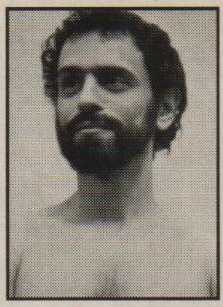 I'm for a stable society too. I don't want to be knifed when I walk out of this room. But I'm not for stability at any price. I'm not for the appearance of contentment and wholeness and readiness for life at the expense of being indeed whole, being prepared, being human.
I'm for a stable society too. I don't want to be knifed when I walk out of this room. But I'm not for stability at any price. I'm not for the appearance of contentment and wholeness and readiness for life at the expense of being indeed whole, being prepared, being human.
The first step in all this is casting off all that conventional imagery about who I am so that I can go forward to discover who I am on my own terms. And I think that every homosexual to a large extent has done this just by dumping a whole lot conventional nonsense about "Men are men and women are women," and "It's that old chemistry, and anything else is unnatural." If it's so natural, how come it has to be drummed into you from the time you're in the crib? And since homosexuals have taken the first step, I think they're in a uniquely good position to take the remaining steps. Now, not many of them do. But I think more and more of them are, so I see a lot of hope in all this. And this is why I'm interested in homosexuals and their creative potential.
-- reprinted from The Ninth Street Center Journal 2, 1974
[D:\dh\web\NSC\3\HTP\J2Counse.htp (147 lines) 2004-12-31 13:00 Dean Hannotte] | ||||||||